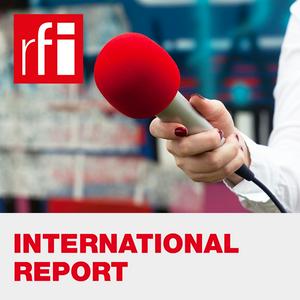Trump's first 100 days: Tariffs war shakes trade and investment in Africa
During the first 100 days of his second term in office, US President Donald Trump has issued a series of executive orders that have unsettled the commodities market and prompted investors to hold off from making new investments in African economies. In the last three months, Trump has presented the world with “a ding-dong of measures and counter-measures," as Nigerian finance analyst Gbolahan Olojede put it.With such measures including increased tariffs on US imports from African nations (as elsewhere), this new regime has effectively called into question the future validity of preferential trade agreements with African states – such as the African Growth and Opportunity Act (AGOA), which allows duty-free access, under strict conditions, to the US market for African goods."The reciprocal tariffs effectively nullify the preferences that sub-Saharan Africa countries enjoy under AGOA," South Africa's foreign and trade ministers said in a joint statement on 4 April.Jon Marks, editorial director of energy consultancy and news service African Energy, echoed this climate of uncertainty: “With the Trump presidency lurching from policy to policy, no one knows where they are. And it's very difficult to actually see order within this chaos."Africa braces for economic hit as Trump’s tariffs end US trade perksHe told RFI he expects long periods of stasis, in which nothing actually happens, when people have been expecting immediate action.“That's going to be, I think, devastating for markets, devastating for investment. The outlook really is grim," he added.CommoditiesIn 2024, US exports to Africa were worth $32.1 billion. The US imported $39.5 billion worth of goods from Africa, the bulk of these being commodities such as oil and gas, as well as rare minerals including lithium, copper and cobalt.“The focus of the Trump administration is on critical minerals now, particularly in the [Democratic Republic of Congo], which is the Saudi Arabia of cobalt,” said Eric Olander, editor-in-chief of the China Global South Project news site.The US is aiming to build non-Chinese supply chains for its military technology.“The F-35s, supersonic fighter jets, need cobalt. When they look at critical minerals, they're not looking at that for renewable energy. They're looking at it specifically for weapons and for their defence infrastructure,” Olander explained.Collateral damageOn 2 April, President Trump unveiled sweeping tariffs on US imports worldwide, declaring that the US “has been looted, pillaged, raped and plundered by nations near and far” and calling this date a “Liberation Day” which will make “America wealthy again”.Stock markets immediately plummeted as a result of his announcement.On 9 April, Trump announced a 90-day pause – until mid-July – on these tariffs. Instead, a flat 10 percent rate will be applied on exports to the US.The exception was China, whose goods face even higher tariffs – 145 percent on most Chinese goods. Beijing retaliated with 125 percent levies on US imports.According to Olander, most African nations have so far been “insulated from the harsh impact of these tariffs” and from the consequences of what is, in effect, a trade war between two economic giants – China and the US.“South Africa, which accounts for a considerable amount of Africa's trade with the United States, is much more exposed to the effects of these tariffs than the rest of the continent,” he said.Africa FirstBut what if Trump's "America First" agenda was to be copied, asks Kelvin Lewis, editor of the Awoko newspaper in Sierra Leone.“Just like Trump is saying America First, we should think Sierra Leone First,” he told RFI. “He is teaching everyone how to be patriotic. We have no reason to depend on other people, to go cap in hand begging, because we have enough natural resources to feed and house all 9 million of us Sierra Leoneans.”He added: “If Africa says we close shop and we use our own resources for our benefit like Trump is telling Americans, I think the rest of the world would stand up and take notice.”Meanwhile, Trump believes his imposition of these increased tariffs has succeeded in bringing countries to the negotiating table.“I'm telling you, these countries are calling us up, kissing my ass. They are dying to make a deal. Please, please sir, make a deal. I'll do anything. I'll do anything, sir,” Trump said on 8 April at a Republican Congress committee dinner in Washington.New marketsOlander believes that the trade war instigated by Trump has resulted in more risks than opportunities for Africa’s vulnerable countries.“But, there is a lot more activity now diplomatically between African countries and other non-US countries,” he added.“Prime Minister Abiy Ahmed from Ethiopia was in Vietnam, as was Burundi's president. There’s more engagement between Uganda and Indonesia, more trade activity and discussions between Brazil and Africa.”Foreign ministers from the BRICS group (Brazil, Russia, India, China and South Africa) met in Rio de Janeiro on 28 April to coordinate their response to Trump’s trade policy.However, securing markets for non-US exports is a challenging task. It took Kenya 10 years “of steady diplomacy” to get China to fund the extension of the Standard Gauge Railway to the Ugandan border, according to Olander.Kenyan president visits China as country pivots away from the US“Whether it's in China, Indonesia, Brazil or elsewhere, it takes time. Exporting into developed G7 markets means facing an enormous number of hurdles, like agricultural restrictions,” he continued. “Then, in the global south, Angola is not going to sell bananas to Brazil, right?”“Trump's trade policies have actually been to depress the oil price,” said Marks. “The price has been under the psychologically low threshold of $70 a barrel.He explains it is because of the demand destruction Trump's policies have placed on global trading.Demand destruction means that people are not investing, “ Marks said. “It's really a period of wait-and-see.”“This will affect prices very profoundly. One of the ironies is that although a lower dollar means that African economies should be able to export their goods for more money, a declining dollar amidst market uncertainties means that investors are not going to be rushing to come into Africa.”

